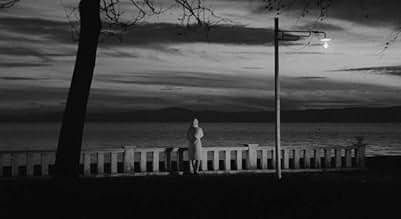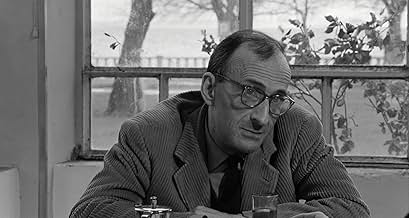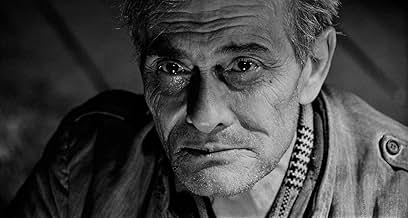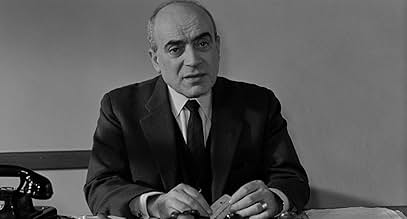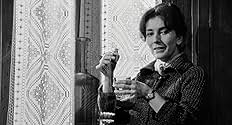IMDb RATING
7.0/10
1.7K
YOUR RATING
While visiting his favorite resort town during the off-season, a novelist investigates the apparent suicide of a woman he was infatuated with.While visiting his favorite resort town during the off-season, a novelist investigates the apparent suicide of a woman he was infatuated with.While visiting his favorite resort town during the off-season, a novelist investigates the apparent suicide of a woman he was infatuated with.
Pia Lindström
- Adriana
- (as Pia Lindstrom)
Pier Giovanni Anchisi
- Francesco - Photographer
- (as Piero Anchisi)
Anna Maria Gherardi
- Servant Girl
- (as Anna Gherardi)
Jean Rougeul
- The Journalist
- (uncredited)
Featured reviews
Fascinatingly dark and elusive, 'La Donna Del Lago' (aka) 'The Possessed' (1965) ominously remains a thrillingly enigmatic, majestically mysterious, almost impenetrable crypto-Giallo by the consistently excellent film stylist, Luigi Bazzoni, the prodigiously talented, intellectual auteur behind equally idiosyncratic, doom-laden, darkly dreamt anti-Gialli masterpiece, 'Footsteps on the Moon'(1975). Since 'La Donna Del Lago' was also written by fellow dramatic iconoclast, Gulio 'Death Laid an Egg' Questi, one might certainly expect to experience a similarly oblique tone, and in terms of starkly confounding genre conventions, skewed scrivener, Questi most certainly doesn't disappoint! While some might consider 'Lady of The Lake' to be just another indulgent example of overwrought nouvelle vague-esque cinematic doodling; but to blithely dismiss this eerily elegiac work as mere self-indulgence is, perhaps, to miss out of one of Italian genre cinema's most glacial,immaculately shot, singularly strange, wickedly off-key, noggin-scratchingly unique thrillers!
A young writer Bernardo (Peter Baldwin) decides to come back to a small town, set nearby a lake, where he had previously stayed and met a attractive maid and waitress – Tilde (Virna Lisi). The place is desolate then, as the action takes place in winter and the tourist are not particularly interested in this place at this part of the year. Bernardo is in search for peace and quiet and this is why he has an intention of having a rest there and working on his new book. However, after some time it dawns on him that, actually subconsciously, he wants to meet the beautiful waitress. He plans to rediscover her and starts searching, after which he is informed by the owner of the hotel about her mysterious death
This is often considered to be one of the earliest examples of giallo genre, along with Blood And Black Lace (1964). In spite of this fact, this cannot be considered, just like later effort by Bazzoni, masterful Footprints On The Moon (1975), to be a typical mystery that made a pattern for all films of this genre, as it differs drastically. In addition to this, the flick is more likely to remind Blow Up (1966) by Antonioni than The Bird With Cristal Plumage (1969) or Deep Red (1975) by Argento. The main character appears to be lost in the world of his own illusions and enquires himself what is real and what is just his imagination, just like David Hemmings in Antonioni's masterpiece. While Michelangelo Antonioni is more interested in general subject of perception and human identity in the world, in which being a witness is a very relative phenomenon, Bazzoni avoids such topics and focuses on delving into Bernardo's mind. Our protagonist himself is not a witness, he's just implicated in a twisted affair surrounding this town. To render psychological aspect even more visible and more articulate, the director utilizes a very slow pace and we can hear our character's thoughts. Owing to this, the viewer is able to follow all the vacillations of the main character and follow all possible ways of Tinde's demise accompanying this mystery envisioned by Bernardo. What is more, Bazzoni exploits black-and-white cinematography which makes things even more fascinating. To sum up, all these elements give it a very distinctive look and it is far from a simplistic murder mystery and the film becomes a sort of a psychological drama. At the end, nothing seems to be concluded and unraveled in detail. In spite of the fact that Bernardo's explanation is the most probable, there are plenty of additional subplots which suggest that many things remain obscure and inexplicable. Thanks to an exceptional editing, chilling sequences of dreams and flashbacks merged together, the ensemble looks terrific.
Therefore, nothing is certain in this flick. The whole plot is shown from the Bernardo's point of view, along with his visions and dreams. This render everything not only a murder mystery, but also a great psychoanalysis of the Bernardo's mentality, exposing all his fears, desires and his vague relationship with Tilde whose personality we get to know through his memory. Thus, this subjective nature and unusual perspective make it so extraordinary and riveting. The script itself isn't the biggest advantage of this picture. If it was made by somebody else, it would possibly be a flop. Fortunately, on account of tremendous direction by Bazzoni, his visual style, exquisite taste for creating adequate atmosphere of anticipation and ambiguity, The Possessed (1965) (La donna del lago) is a true gem.
The cast is nothing special, but all of the actors manage to achieve a satisfying level of acting artistry. Peter Baldwin, a little known television actor, gives a quite decent performance. There are a couple of familiar faces: such as Phillipe Leroy, known for his roles in Yankee (1966) by Tinto Brass, and Salvo Randone from Investigation of a Citizen Above Suspicion (1970) by Elio Petri. Their roles are rather a minor ones, as Peter Baldwin is the most important character and the action revolves around him.
Overall, La donna del lago (1965) might not be as visually striking as gorgeous Footprints On The Moon (1975), nonetheless it's a very impressive little movie that should be more known than actually it is. The story itself is nothing really new, but the way it is executed makes this one refreshing and worth a look. Luigi Bazzoni attaches a great importance to a psychological aspect of characters in the film and owing to this outshines many other flicks in its genre. Now, it remains only a hidden gem and sadly it seems there is no possibility to popularize it in the nearest future. Pity. This deserves to be more prevalent.
Therefore, nothing is certain in this flick. The whole plot is shown from the Bernardo's point of view, along with his visions and dreams. This render everything not only a murder mystery, but also a great psychoanalysis of the Bernardo's mentality, exposing all his fears, desires and his vague relationship with Tilde whose personality we get to know through his memory. Thus, this subjective nature and unusual perspective make it so extraordinary and riveting. The script itself isn't the biggest advantage of this picture. If it was made by somebody else, it would possibly be a flop. Fortunately, on account of tremendous direction by Bazzoni, his visual style, exquisite taste for creating adequate atmosphere of anticipation and ambiguity, The Possessed (1965) (La donna del lago) is a true gem.
The cast is nothing special, but all of the actors manage to achieve a satisfying level of acting artistry. Peter Baldwin, a little known television actor, gives a quite decent performance. There are a couple of familiar faces: such as Phillipe Leroy, known for his roles in Yankee (1966) by Tinto Brass, and Salvo Randone from Investigation of a Citizen Above Suspicion (1970) by Elio Petri. Their roles are rather a minor ones, as Peter Baldwin is the most important character and the action revolves around him.
Overall, La donna del lago (1965) might not be as visually striking as gorgeous Footprints On The Moon (1975), nonetheless it's a very impressive little movie that should be more known than actually it is. The story itself is nothing really new, but the way it is executed makes this one refreshing and worth a look. Luigi Bazzoni attaches a great importance to a psychological aspect of characters in the film and owing to this outshines many other flicks in its genre. Now, it remains only a hidden gem and sadly it seems there is no possibility to popularize it in the nearest future. Pity. This deserves to be more prevalent.
Having been very impressed by co-director Bazzoni's subsequent "The Fifth Cord", I have been very keen to see "The Lady of the Lake" since I first heard of it four or five years ago when i read Adrian Luther Smith's Excellent "Bloody and Black Lace" - a definitive collection of giallo reviews. It appears, under the title "The Possessed" in the obscure and rare titles section, along with a superlative review. Subsequent attempts to track the title down were in vain, until I popped into El Corte Ingles on my most recent Spanish holiday and found it on Filmax's "Giallo" collection under the title "El Mujer Del Lago". This is the only DVD outing I've ever heard of and there were both pros (a fantastic anamorphic print) and cons (it's Spanish and Italian only, with Spanish subs) - the cons apply as I'm an English speaker, but I was able to manage enough Spanish (with my dictionary at hand) to navigate through this beautiful, atmospheric film in Spanish with subs showing.
It's as good as it's advance word suggests - an ice cool, incredibly shot mood piece which emerges as a giallo only in hindsight, as at the time it was filmed, the concept hadn't been formed and we were still four years away from the giallo cycle proper which was initiated by the box office success of Argento's "The Bird with the Crystal Plummage" and Martino's "The Case of the Scorpion's Tail" amongst others.
The plot: A writer returns to the small town where he had vacationed previously. he's keen to meet up with his former maid, Tilde, with whom he had enjoyed a romance previously. However, she isn't there and the locals are not keen on talking about why. As he goes through the town, casual encounters build up an atmosphere of menace as everyone seems to be brushing her untimely death under the carpet. The writer presses on in his investigations, seeking the facts behind her death and finding an awful lot of problems lying beneath the town's impassive surface, but in doing so unleashes the pitch black heart of darkness that lies within this film's conclusion.
In terms of style, this is far away from the post-Argento iconography of the giallo. There are no black leather gloved killers here, no stalk and slash killings. All of the (physical) violence occurs off camera. But this remains one of the most claustrophobic, oppressive films of it's time. Much of the drama unfolds within the walls of the hotel, with flashbacks, fantasies and the present unfolding in this space. The film it feels most like is Renais' "Last year At marienbad", but with a more defined narrative. I suspect a lot of the time shifts come from co-screenwriter Gulio Questi, who would later return to the editing styles shown here in his own films such as "Django Kill... If you live, shoot!". Bazzoni contributes his unnerving eye for architecture as counterpoint and subtext to the story (he's on a par with Michael Mann in this respect).
This is a film about love, all types of love, from the casual to the obsessive, and the film gradually cranks up the tension until the conclusion. I hope that a wider audience will be able to embrance this with a DVD release from an outfit such as No Shame or Blue Underground. In the meantime, I'd advise anyone who cares about atmospheric horror/ thriller cinema to pick up the Spanish release, which can be had for a remarkable price (I paid 8.95).
It's as good as it's advance word suggests - an ice cool, incredibly shot mood piece which emerges as a giallo only in hindsight, as at the time it was filmed, the concept hadn't been formed and we were still four years away from the giallo cycle proper which was initiated by the box office success of Argento's "The Bird with the Crystal Plummage" and Martino's "The Case of the Scorpion's Tail" amongst others.
The plot: A writer returns to the small town where he had vacationed previously. he's keen to meet up with his former maid, Tilde, with whom he had enjoyed a romance previously. However, she isn't there and the locals are not keen on talking about why. As he goes through the town, casual encounters build up an atmosphere of menace as everyone seems to be brushing her untimely death under the carpet. The writer presses on in his investigations, seeking the facts behind her death and finding an awful lot of problems lying beneath the town's impassive surface, but in doing so unleashes the pitch black heart of darkness that lies within this film's conclusion.
In terms of style, this is far away from the post-Argento iconography of the giallo. There are no black leather gloved killers here, no stalk and slash killings. All of the (physical) violence occurs off camera. But this remains one of the most claustrophobic, oppressive films of it's time. Much of the drama unfolds within the walls of the hotel, with flashbacks, fantasies and the present unfolding in this space. The film it feels most like is Renais' "Last year At marienbad", but with a more defined narrative. I suspect a lot of the time shifts come from co-screenwriter Gulio Questi, who would later return to the editing styles shown here in his own films such as "Django Kill... If you live, shoot!". Bazzoni contributes his unnerving eye for architecture as counterpoint and subtext to the story (he's on a par with Michael Mann in this respect).
This is a film about love, all types of love, from the casual to the obsessive, and the film gradually cranks up the tension until the conclusion. I hope that a wider audience will be able to embrance this with a DVD release from an outfit such as No Shame or Blue Underground. In the meantime, I'd advise anyone who cares about atmospheric horror/ thriller cinema to pick up the Spanish release, which can be had for a remarkable price (I paid 8.95).
Glorious first film from Luigi Bazzoni, who would go on to make, The Fifth Cord and Footprints. Here with wonderful b/w cinematography from Barboni we have a straightforward enough, if noirish, beginning, gradually deepening into something resembling a gothic horror before developing before our very eyes into something more resembling a giallo. Always good to look at and with persuasive and involving dialogue, this engages from the start and although the tale is leisurely told, occasionally resembling Last Year At Marienbad, we never loose interest. Yet another near lost gem wonderfully restored thanks to Arrow. Oh and I almost forgot, we get a dreamy substantial cameo from the lovely Virna Lisi.
I saw this on late-night local TV in the early 70s, tolerably dubbed, under the title LOVE, HATE AND DISHONOR, and was immediately taken by it's eerie, VAMPYRE-like style.
It never played on TV again, and in the late 70s to 90s I searched for it in vain. I did catch a reference to it under the title Possessed in the Encyclpedia of Horror Movies.
Finally found a poor quality English-subtitled VHS a few years back from VideoSearch of Miami and enjoyed it once again. I guess I have to add two more lines of text to meet the minimum requirement to post. I hope this is enough
It never played on TV again, and in the late 70s to 90s I searched for it in vain. I did catch a reference to it under the title Possessed in the Encyclpedia of Horror Movies.
Finally found a poor quality English-subtitled VHS a few years back from VideoSearch of Miami and enjoyed it once again. I guess I have to add two more lines of text to meet the minimum requirement to post. I hope this is enough
Did you know
- ConnectionsReferenced in Once Upon a Time... in Hollywood (2019)
- How long is The Possessed?Powered by Alexa
Details
- Release date
- Country of origin
- Language
- Also known as
- Love, Hate and Dishonor
- Filming locations
- Brunico, Bolzano, Trentino - Alto Adige, Italy(lakeside town: street views, shops, train station)
- Production companies
- See more company credits at IMDbPro
- Runtime1 hour 35 minutes
- Color
- Sound mix
- Aspect ratio
- 1.85 : 1
Contribute to this page
Suggest an edit or add missing content

